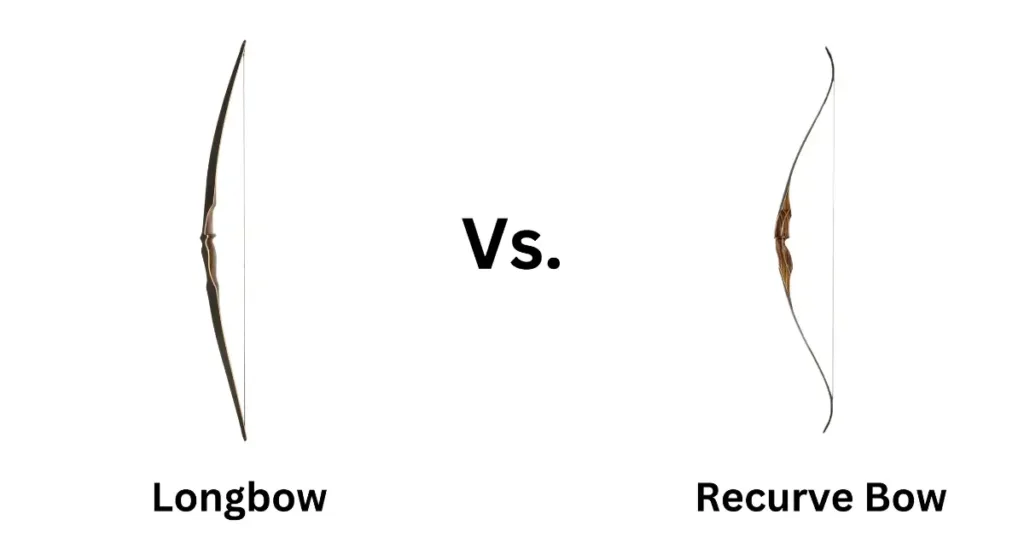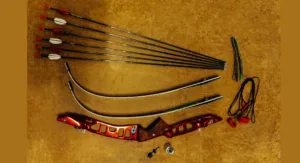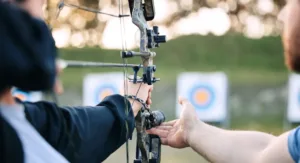Enter the world of archery, where tradition meets modernity, and enthusiasts debate the merits of recurve bows and longbows. The choice between these two iconic types of archery equipment is not just about personal preference; it’s about understanding what each has to offer and how it aligns with your shooting style, whether you’re bow hunting or participating in target archery competitions. Join us as we break down the essentials, performance factors, and expert opinions to help you make an informed decision.
Understanding The Basics Of Recurve Bow & Longbow
Definition Of A Recurve Bow
The recurve bow stands out with its distinct design. Characterized by limbs that curve away from the archer when unstrung, this bow offers compact size and power. Typically used in Olympic archery, its design stores more energy and delivers faster arrow speeds. Its versatility makes it popular among archers who enjoy traditional archery and target shooting.
Also Read : Longbows For Beginners: A Beginner’s Guide
Definition Of A Longbow
The longbow, with its tall, graceful shape, dates back to medieval times. Traditionally made from a single piece of wood, it’s known for its simplicity and elegance. Unlike the recurve, it lacks pronounced curves at the tips, which results in a longer draw length. This feature makes it a favorite among traditionalists and those who enjoy archery’s historical aspect.
Also Read : Mastering The Art Of Recurve Bow Archery For Beginners
Recurve Bow Vs. Longbow Differences In Design
While both bows serve the same fundamental purpose, their designs lead to different shooting experiences. The recurve’s curved limbs provide a distinct advantage in storing energy, while the longbow’s length offers stability and a smoother draw. Understanding these differences is essential for choosing the right bow for your needs.
Historical Background
Recurve Bow Evolution
The recurve bow boasts a rich history, tracing back to ancient civilizations such as the Egyptians and Mongols. Its compact design makes it ideal for horseback archery, allowing powerful shots without large bows. Over time, it evolved into a versatile tool used in warfare and sports.
A Look Back At Longbow’s History
The longbow gained fame during the Middle Ages, particularly in England. Notable for its role in battles such as Agincourt, it became a symbol of English military prowess. Its simplicity and effectiveness made it a staple in historical hunting expeditions and battles, showcasing its enduring appeal.
Cultural Significance
Both bows have played significant roles in various cultures. While the recurve was favored by Asian and Middle Eastern civilizations for its portability and power, the longbow became synonymous with European warfare. Their cultural significance continues to influence archers today, whether they’re drawn to the elegance of the longbow or the versatility of the recurve.
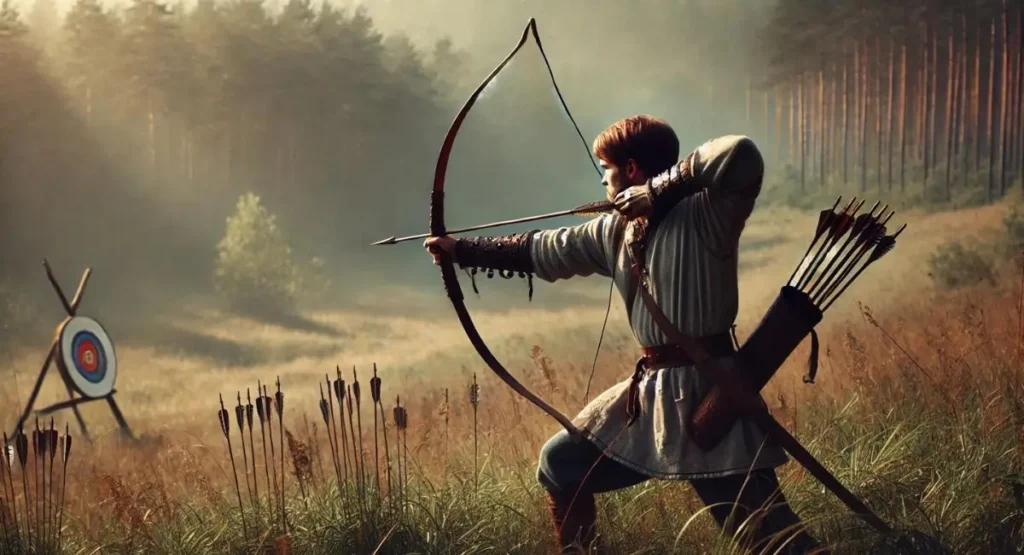
Performance Comparison
Shooting Mechanics
Shooting mechanics offer distinct experiences for recurve and longbow. The recurve requires precise form and technique to maximize its speed and accuracy, making it a favorite among competitive archers. On the other hand, the longbow offers a smoother draw, allowing for a more instinctive shooting style favored by traditionalists.
Power And Speed
In terms of raw power and speed, the recurve often edges out the longbow. Its design allows for faster arrow release, making it ideal for scenarios that require quick, powerful shots. However, the longbow’s long draw can provide impressive power for those who master its technique, particularly in situations that require sustained shooting.
Accuracy
Accuracy is critical in choosing the right bow. Recurve bows, with their precision and adjustability, offer enhanced accuracy for target archery and competition.
According to expert Byron Ferguson,
“The precision of a recurve can be likened to the finesse of a fine instrument.”
However, longbows are not to be underestimated, as their stability and straightforward design can lead to excellent accuracy for seasoned archers.
Also Read : How to Measure Draw Length of a Bow – Archery Guide
Usability And Applications
Hunting With Bows
For bow hunters, the choice between a recurve and a longbow hinges on the type of game and hunting environment. Recurves, with their higher speed and portability, are often preferred for small to medium game on varied terrains. Longbows, however, offer a quieter, more stealthy option, making them suitable for larger game and open landscapes.
Target Shooting
Target shooting, where precision and consistency are key, is where recurve bows excel. Their adjustability and balance make them ideal for hitting precise targets. However, longbows offer challenge and satisfaction for those who enjoy the traditional archery approach, providing a rewarding experience in competition.
Ease Of Use
For those newly introduced to archery, ease of use is paramount. Recurve bows, with their short learning curve and adaptability, are often recommended for beginners. Yet, many archery enthusiasts praise the longbow for its simplicity and direct connection to archery’s roots, offering an unmatched sense of accomplishment once mastered.
Also Read : Mastering Archery Safety: Understanding Dry Firing A Bow
Pros and Cons Of Recurve Bow & Longbow
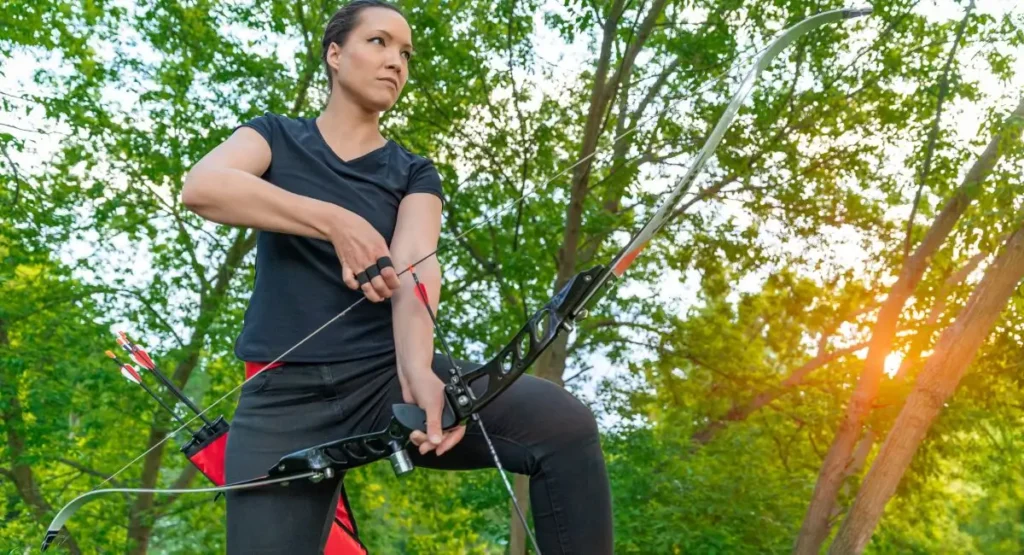
Recurve Bow
Advantages
- Compact and portable design
- High speed and power
- Versatile for various archery techniques
Disadvantages
- Requires maintenance and tuning
- Steeper learning curve for beginners
Longbow
Advantages
- Simple, elegant design
- Smooth draw and shooting style
- Excellent for traditional archery
Disadvantages
- May require more accuracy practice
- Bulkier and less portable
| Feature | Recurve Bow | Longbow |
| Design | Compact with curved limbs | Tall, single-piece construction |
| Power & Speed | High-speed arrow release | Smoother, steady power |
| Accuracy | Precise, adjustable | Stable but challenging for precision |
Also Read : Master Your Archery Game With A Deep Understanding Of Bow Parts
Expert Opinions
Insights From Professionals
Renowned archer Fred Bear once mentioned,
“There’s an elegance to the longbow that speaks to its simplicity and power.”
Such expert opinions remind us that the choice between these bows is deeply personal and often linked to one’s connection to traditional archery.
Community Perspectives
The ArcheryTalk community offers valuable insights into bow comparisons. Many archers appreciate the challenge of mastering both styles, noting that each bow type brings its own set of rewards and considerations.
Interviews And Articles
For those seeking further expertise, interviews and articles by experts like Byron Ferguson provide detailed analyses and tips for choosing the right bow. These resources offer first-hand experiences and strategies for maximizing bow performance.
Choosing The Right Bow For You
Factors To Consider
When choosing between a recurve and a longbow, consider factors such as your intended use, skill level, and personal preferences. The recurve may be suited to those seeking versatility, while the longbow appeals to those drawn to tradition and simplicity.
Tips For Beginners
For archery beginners, starting with a recurve can provide a more accessible entry point. Its adjustability and widespread availability make it an excellent choice for honing skills before exploring other options.
Making An Informed Decision
Ultimately, the decision between a recurve and a longbow should align with your goals and passion for archery. Testing both types, seeking advice from seasoned archers, and engaging with archery communities can guide you toward the perfect bow.
Also Read : Mastering The Bow And Arrow: The Fun And Easy Guide For Beginners
Resources And References
Recommended Books
For those eager to explore more, “The Traditional Bowyer’s Bible“ series offers in-depth knowledge of bow design and archery techniques. This valuable resource provides historical context and practical advice for all archers levels.
Online Communities
Engage in online archery communities like ArcheryTalk and Tradbow to connect with fellow enthusiasts and gain insights from experienced archers. These platforms offer forums, discussions, and valuable tips for improving your skills.
Additional Reading
Publications like “Archery Focus” magazine and “Bowhunter“ magazine deliver expert articles and reviews on bow hunting and target archery. These resources keep you informed about the latest trends and innovations in archery.
Concluding Thoughts
In the timeless debate of recurve bow vs longbow, the answer lies in your personal connection to archery. Whether you seek the speed and precision of a recurve or the elegance and simplicity of a longbow, both offer unique experiences that cater to different archery pursuits.
By considering your goals, preferences, and the insights shared in this guide, you’ll be well-equipped to make an informed choice. Embark on your archery journey with confidence, knowing that each path leads to a fulfilling and rewarding adventure.
For further exploration, check out our recommended resources and engage with the vibrant archery community. Share your thoughts in the comments below—what’s your bow of choice and why?
Also Read : Discover The Joy Of Archery With A Bow And Arrow For Beginners
Frequently Asked Questions (FAQs).
Which Is Better, A Longbow Or A Recurve Bow?
The choice between a longbow and a recurve bow depends on your preferences and intended use. Recurve bows offer speed and versatility, making them ideal for target archery and competitions. Longbows provide a traditional shooting experience and are favored by those who appreciate simplicity and historical significance.
What Are The Disadvantages Of A Recurve Bow?
While recurve bows offer many advantages, they require more maintenance and tuning due to their complex design. Additionally, the learning curve can be steeper for beginners than other types of traditional bows.
What Is The Advantage Of A Recurve Bow?
There are many techniques and applications that can be performed with a recurve bow because of its compact design, which allows it to be used for target shooting to bow hunting.
What Are The Advantages Of A Longbow?
Longbows offer a smooth draw and shooting style, making them an excellent choice for traditional archery enthusiasts. Their simple design and historical significance appeal to those seeking archery’s roots.
What Is The Most Powerful Type Of Bow?
The recurve bow is generally considered more powerful due to its ability to store and release energy efficiently. However, power also depends on draw weight, bow design, and shooting style.
What Is The Most Efficient Bow?
Efficiency of a bow relates to its ability to effectively transfer stored energy to the arrow. Recurve bows are often more efficient due to their design, which maximizes power and speed. However, both recurve and longbows have their unique strengths, making them efficient choices for different scenarios.
Recommended Articles
- The Ultimate Guide To Choosing Between Compound Bow vs Crossbow
- The Archer’s Craft: Understanding Parts Of Recurve Bow
- An Ultimate Bow Size Chart Guide For Archers
- A Comprehensive Guide To Pick Best Budget Crossbows
- Unveiling the Intricacies: Anatomy of a Bow Decoded
- Axe 405 Crossbow Problems: Overcoming Common Problems

